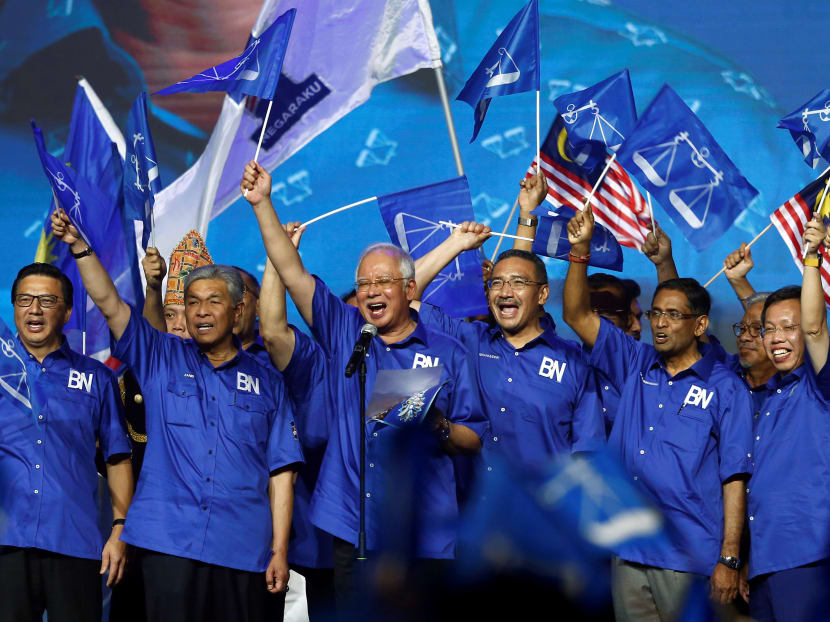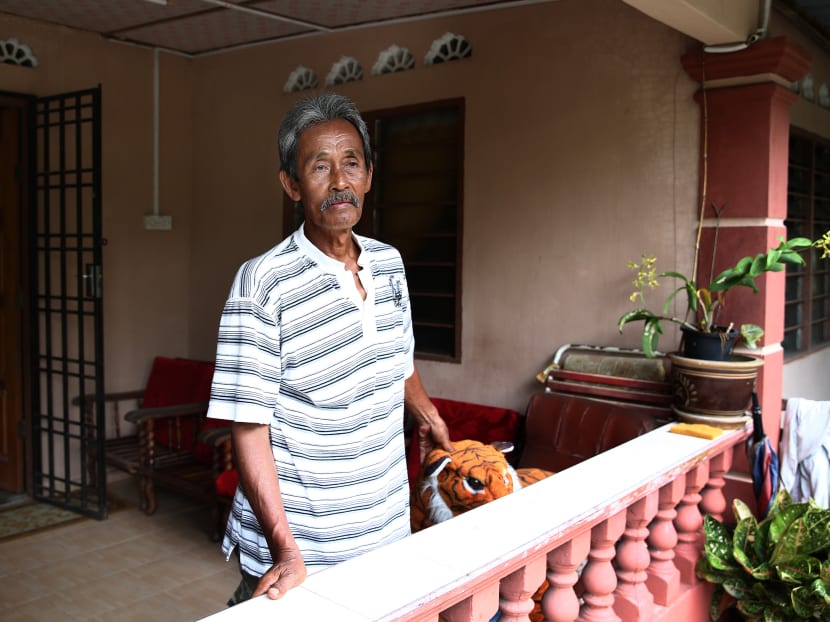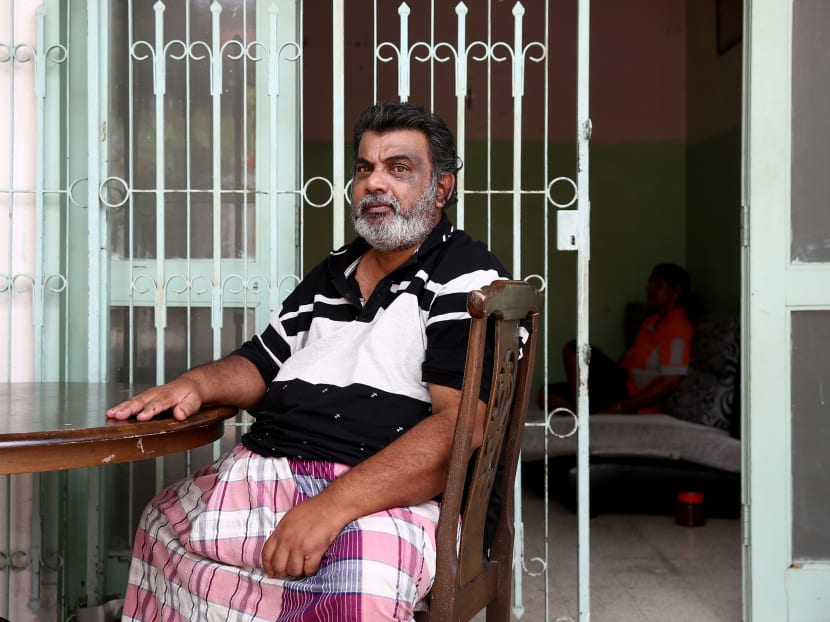When it comes to hooking the voter, dangling bait brings mixed results
KEDAH — Famous Malaysian celebrities, including popular actors Fattah Amin and Rozita Che Wan, were there to entertain. Houses and motorcycles were among RM1.1 million (S$371,800) worth of prizes being given out in a lucky draw. But the recently-held public event in Malaysia’s northern state of Kedah was no ordinary fun fair.

Malaysia's Prime Minister and president of ruling party National Front, Najib Razak and other party leaders wave the party flags during the launch of its manifesto for the upcoming general elections in Kuala Lumpur, Malaysia April 7, 2018.
KEDAH — Famous Malaysian celebrities, including popular actors Fattah Amin and Rozita Che Wan, were there to entertain. Houses and motorcycles were among RM1.1 million (S$371,800) worth of prizes being given out in a lucky draw. But the recently-held public event in Malaysia’s northern state of Kedah was no ordinary fun fair.
Nestled between stalls offering games and food at the eight-day Ekspo Muafakat Kedah were booths showcasing the achievements and a proposed five-year masterplan of the state government, which is currently in the hands of the ruling Barisan Nasional (BN) coalition.
To many who will be voting in Malaysia’s General Election on May 9, these booths are a familiar sight.
“We know these lucky draw prizes are actually carrots that BN always uses to sway us to their corner,” Muhd Fadhil Khadir, 45, who sells banana and tapioca chips to earn a living, said in Malay.
Such carrots are a mainstay of the BN’s vote-getting arsenal. In the past few weeks, several of the coalition’s top leaders, including Prime Minister Najib Tun Razak and his deputy, Ahmad Zahid Hamidi, have made several trips to Kedah – which has been touted as one of the states which will see a hot contest in the upcoming election - to announce giveaways.
In Kedah, the home state of the opposition’s flag-bearer, former prime minister Mahathir Mohamad, BN’s largesse is at full throttle.
On a recent trip to Langkawi, for instance, Datuk Seri Najib announced an RM1.315 billion (S$445 million) development budget to expand the island’s infrastructure, including a new government hospital as well as a fire and rescue station.
Separately, DPM Datuk Seri Ahmad Zahid said that the government would allocate RM 246.23 million for development projects in the Kedah districts of Kulim and Bandar Baharu.
Speak to some residents, however, and the impression one is left with is that the effectiveness of this strategy is questionable.
Some Kedah residents who spoke to TODAY said they would not rise to the bait. The promises being made, they say, are not enough to alleviate the rising cost of living. Rather than dangling carrots, they say, BN should prioritise this.
Farmer Mohd Hasani Daud, 48, who lives in the district of Pendang, added that at each election, similar promises are made, but are often left unfulfilled once the heat of hustings has dissipated.
“Instead,” he said, “they put money into their own pockets”.
As Mr Muhd Fadhil received his lucky draw prize, a SYM VTS 200 motorcycle that would have cost him RM 6,800 (S$2,300), he recalled one of the BN people saying “don’t forget to vote for us”. He responded with a wry smile.
“In my heart, I was saying there is no way I’m going to vote for BN. I am a PAS (Parti Islam Se-Malaysia) supporter,” he said. “BN likes to cheat the people, now we’re cheating them back. We will take whatever goodies they give, but we won’t vote for them.”

(Above) Farmer Ibrahim Ahmad, who lives in a Felda settlement in Ayer Hitam, Johor, says villagers need the handouts because they are poor and live on a day to day basis. Photo: Nuria Ling/TODAY
Some political analysts, including the executive director of the Penang Institute think-tank, Dr Ooi Kee Beng, noted that the effectiveness of BN’s tried and tested methods of doling out cash and promises of development is waning, and a migration of sorts to the opposition could result.
Dr Ooi said there is a “sense of moral outrage and betrayal over the corruption scandals and the government’s self-absorption”, which he defined as its use of one-off payments and other assistance, rather than sustainable, long-term solutions.
He added: “Just how much of a backlash depends on how well the opposition can ridicule the BN in the campaign period.”
Similar grouses were shared by residents in the town of Ayer Hitam in Johor Bahru, which could see a fierce contest between the Democratic Action Party, a component party of the opposition Pakatan Harapan coalition, and the Malaysian Chinese Association (MCA), which is part of BN.
Bus conductor Sreedaran Pillai, 53, pointed out that the introduction of Goods and Services Tax in 2015 has left middle-class families like him struggling to cope.
He brings home RM 1,300, including overtime pay, and after paying for rent, utilities and groceries, he is usually left with only RM100. The cost of living, he says, has seen him leaning towards a vote for the opposition, despite the fact that he is a long-time BN supporter.
“I voted for BN last time round, and in the last five years, nothing has changed. In fact, the situation is worse,” he said, adding that goodies will do little to sway him to BN’s corner. “They will give one-off items like tins of biscuits and other groceries. I’m sick of it.”
“They need to have long-term measures. BN thinks the rakyat (people) are like children and if you hand out sweets, we’re happy. They are out of touch.”

(Above) Bus conductor Sreedaran Pillai, a resident of Ayer Hitam, Johor, says the GST has made life difficult for families like his. Photo: Nuria Ling/TODAY
That is not to say BN’s handouts have no truck with all voters.
A sizeable number of villagers in rural areas do vote for the ruling coalition precisely because of the gifts.
Farmer Jasni Abdul Hamid, 54, who lives in the Yan district in Kedah, gave one reason for this: The villagers need the handouts because they are poor and live on a day to day basis.
“They’re thankful to BN and will support them,” he added.
Dr Mohamed Nawab Mohamed Osman, coordinator of the Malaysia Programme at the S. Rajaratnam School of International Studies (RSIS), noted that BN’s tactic of giveaways remains effective among the poorer segments of the society. He added: “The carrots dangled are also conditional on BN winning the elections, and the villagers will benefit only if the party wins. Because of that, some voters will vote for them.”
Hisommudin Bakar, the executive director of independent research firm Ilham Centre, added that voters are “obligated to throw their support behind the party that helps them”, adding that there is also a fear that they might not get help in future if they vote for the opposition.
Then there are those who fervently believe that the ruling coalition has lived up to its end of the bargain.
Among them is 60-year-old Ibrahim Ahmad, a farmer and resident of a Felda settlement in Ayer Hitam, who noted that BN still provides subsidies for agriculture.
“On the whole, yes, they might have delivered their promises later than expected. But at least they delivered, unlike the opposition, which only makes empty promises,” he said.
The range of sentiments mean only one thing is clear: Everyone loves a handout.
Whether they will respond in kind at the ballot is quite another matter altogether.






